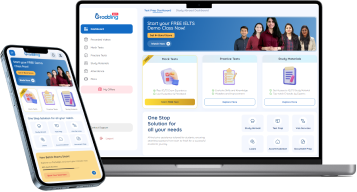ELTS speaking test part 1, 2, and 3 comes with many challenges. Thus, this blog talks in detail about all the problems a candidate can face along with possible solutions for them.

Table of Contents
Question 1. What is the Total Duration of the IELTS Speaking Test?
Question 2. What is the Score Segregation of the IELTS Speaking Test?
Question 3. Will My IELTS Speaking Test Be Recorded Every Time?
Question 4. Is the IELTS Speaking Test Conducted on the Same Day as Other Sections?
Question 5. How Many Examiners Will Be There in the IELTS Speaking Test?
International English Language Testing System comprises four papers: reading, writing, speaking, and listening. Only when you crack these you will become an eligible candidate to move abroad. But each section has its own set of challenges. This blog will solely talk about IELTS speaking part challenges and their solutions. It will also give you an insight into the segregation of the speaking test. Thus, without any delay, move forward for more details.
The IELTS speaking test is divided into three tasks. Every section is different in its own way. It tests your abilities and practice. This blog will guide you on what each task comprises. It talks about IELTS speaking part challenges, questions asked, and much more. Thus, to explore what it takes to pass the three tasks of the IELTS speaking test; stick to the end of this page.
Here are the common challenges you can face in the first round of the IELTS speaking test. Thus, have a look at them and improvise if you want a good band score.
As it is the first round of the test, you might become underconfident. But the key to success here is staying calm and patient. Try to converse with confidence; it leaves a good impression. Approach every question like a discussion rather than a test.
As IELTS speaking part 1 is primarily about yourself, giving extended answers will make no sense. Thus, try to keep a balance between too-short and long answers. It is a round where an interviewer only wants to know a bit about your personality.
Taking a pause is vital while speaking. If you speak continuously without a break, it might become difficult for another person to understand. Also, it is recommended to take a few moments when an interviewer asks a question because you need time to think before giving a valid answer.
More often, you execute your learnings while taking the IELTS speaking test. Thus, unknowingly, you give prepared answers. Therefore, you have to avoid this situation because many candidates give the same repetitive answers, leaving a poor impression on the interviewer.
Non-native speakers generally use filler words such as “um” and “like” while responding. Usage of filler words frequently does not convey the exact idea to the examiner. Thus, avoid its use if you want to have clear communication with the interviewee.

IELTS speaking test part 1 is a general discussion about you, your studies, childhood, interest areas, family, or free time. Therefore, the common questions asked in this round can be:
1. What is your name?
2. What are your study plans for the future?
3. How many people are there in your family?
4. How do you like to spend your free time?
5. What are your interests or hobbies?
IELTS task 2 of the speaking test is the round where you will be given cue card topics and some prompts wherein you have to speak for 1-2 minutes. Before speaking, you will be given a pen, paper, and 1 minute to prepare. Thus, explore the common challenges you can face while giving this test.
In the hassle of speaking for up to 2 minutes, you can make the mistake while going through the question. It results in inappropriate answers that the interviewer might not be expecting. Thus, make utilization of the preparation time wisely to knack the round.
In the limited time, it is challenging to respond to the queries and frequently speak over them. The speaking IELTS exam tests your vocabulary, grammar, and critical thinking skills. In a nutshell, an examiner ascertains your ability to make informed decisions. Thus, practice by heart to nail in this round.
Many times, it happens that you think right but speak something else. It results in giving irrelevant answers to the IELTS speaking questions. Thus, take notes so that there is no conflict between the query and the solution. It helps you focus more on what you are saying instead of thinking.
Round 2 of the IELTS test is an impromptu task where many skills, such as fluency, critical skills, vocabulary, and time management, are analyzed. Thus, perfection comes when you practice more and more. Therefore, rehearse every day if you want the best outcome.
As IELTS speaking part 2 demands you to speak for up to 2 minutes, there is a chance of getting stuck because you do not have a script that you can memorize. Thus, make it a habit of speaking in English in your daily life so that you become well-versed in the language.

Here is an example giving you a gist of possible questions that could asked in the second round.
Question: Describe a person you admire in your life.
Prompts:
The IELTS speaking part 3 involves an in-depth discussion between the interviewer and you on the topic on which you have already spoken in part 2. Now that you have a gist about it get to know common challenges faced in this test.
In the third round, there will be no provision of paper or a pen. The examiner will randomly ask you a question related to the topic. Thus, you should stay attentive and interpret its meaning in the first go. Many candidates get stuck at this step because they do not listen to the question carefully.
The round 3 aims to test your reflective responses. It means how well you respond to the query. It should be logical and also examine your presence of mind. Thus, take a pause for a few seconds, think, and then reply because whatever you say will be analyzed.
It is normal to take a pause to think and reply, but it makes no sense when you delve deep into pondering over an issue. Many candidates take long pauses and then reply. Afterwards, even if you give the right answer you have to be logically correct in the stipulated time.
Many times, it happens that a candidate does not understand the question. Thus, they give incomplete or irrelevant answers that do not justify the query asked. Therefore, pay attention to giving an answer that satisfies the other person sitting in the room.
Parts 1 and 2 of the IELTS test majorly focus on your thinking and perspective. But part 3 wants you to speak from a broad horizon. It means speaking in general as to what people think about IELTS speaking topics or a particular fact. Thus, avoid the mistake of giving opinionated views on a topic.

Here are some examples that continue the questions asked in the round 2:
1. Why do you think the traits you learned are valuable?
2. How does their involvement make you a better person?
3. Is it necessary to have a source of inspiration nowadays?
These are the common problems that you can encounter while working on IELTS parts 1, 2, and 3. These can be managed if you take the initiative from your end. Thus, have a look at what you can do to overcome IELTS speaking part challenges or situations referred to above.
Want to know how you can perform better in any part of the IELTS test? If yes, take a look at the pointers mentioned below.
The best tip to overcome IELTS speaking challenges is to record yourself. When you do that, you identify areas for improvement, such as vocabulary, fluency, accent, and many more aspects. Listen to the recording and work on areas where you lag.
IELTS is a challenging exam, but it can be cleared in one go if you choose to practice daily. It helps to improve your grammar, pronunciation, and fluency. Thus, converse in English until you do not become proficient at it.
Active listening is vital while taking the IELTS exam. Thus, give as many mock tests as possible. It will help you improve your focus and will make you capable of responding with the best answers in a limited time frame.
Every part of the IELTS exam has different expectations. The first round will lean towards giving brief answers, whereas the third round expects you to give more extended replies. Thus, it is you who should know how to answer with a balanced approach.
This blog gave you an insight into IELTS speaking part challenges and tips to overcome them. Thus, take care of the above-mentioned pointers if you are planning to appear for it. The problems and solutions referred to above can simplify your test journey and help you achieve a good band score. Therefore, be a smart student and clear the speaking test in one go.
Also Read: https://www.gradding.com/blog/exams/common-ielts-mistakes-to-avoid to avoid frequently occurring errors and score a band score of 8 in the test.
The IELTS speaking test lasts for an average of 11-14 minutes. The duration of part 1 will be 4-5 minutes, part 2 will be 3-4 minutes, and part 3 will be 4-5 minutes.
Scores are analyzed on the four segments: pronunciation, grammar, lexical resource, and fluency. Every area contributes to the 25% of the overall score.
Yes, your IELTS speaking test is always recorded. It is via the recording the examiner determines your overall score.
The IELTS speaking test can either be taken seven days before or after the test date. Thus, always prepare yourself in advance because it can be conducted anytime near the scheduled date.
The examiner in the IELTS speaking test will always be one. That person will be solely responsible for managing the test and evaluating the candidate at the same time.

We are available in :
BangaloreAhmedabadJaipurHyderabadKeralaPuneChandigarhMumbaiGurgaonChennaiKolkataTrivandrumNoidaKochiCalicutKottayamKollamThrissurIndoreUdaipurdisclaimer:logos and other registered trademarks of universities used on this platform are held by their respective owners. Gradding does not claim ownership or association on them, and their use is purely for informational and illustrative purposes.

